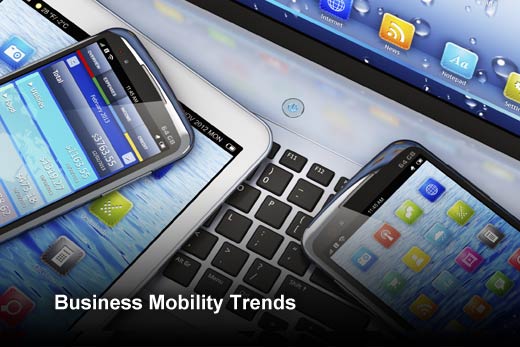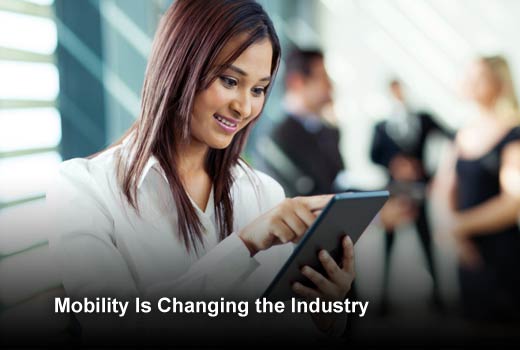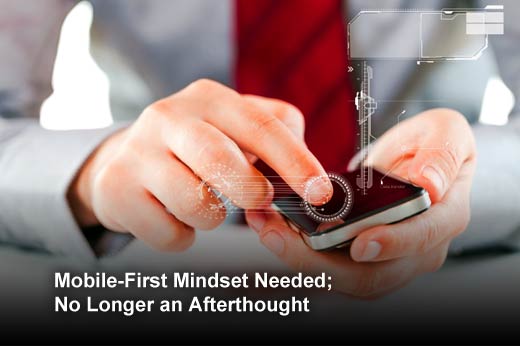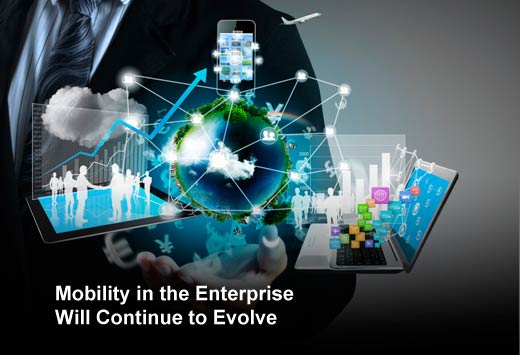Mobility continues to have a profound impact on the enterprise. Smartphones and tablets have quickly become part of the corporate ecosystem. Improvements in wireless and cellular coverage are enabling us to be productive anywhere, anytime. Today’s workforce is demanding flexibility to choose to work their own way including choices ranging from which devices they carry to the platform they want to use on their desktop or laptop.
We’re seeing industry leaders acknowledge the need for technology flexibility and take action to adapt and move enterprise applications to mobile devices. These trends have had a huge impact in making companies realize the power of mobile and its key role in the new IT enterprise reality. Is your organization taking the right steps to prepare?
In this slideshow, Eric Reed, CTO, GE Capital, has identified mobile trends that are having a significant impact on today’s organizations.
Business Mobility Trends
Click through for trends in mobility that are having a significant impact on today’s businesses, as identified by Eric Reed, CTO, GE Capital.
Mobility Is Changing the Industry
Advancements in technology and changes in consumer behavior are shifting the industry of mobile devices toward a form factor that is bigger than a phone but smaller than a tablet. A new category of mobile devices, Phablets, is emerging with a screen real estate between the two that is increasingly attractive to users as they consume more and more content on their mobile devices.
This trend will be accelerated by three factors. First, the development of peripherals – such as keyboards and monitors – allows for these devices to be docked at the office or at home and used like a traditional PC. Second, the introduction of productivity software such as Office on these devices enables them to serve as a substitute for laptops. Third, the continued boost in CPU horsepower and memory are quickly making these devices more capable in functioning as a replacement to the PC or laptop.
Mobile-First Mindset Needed; No Longer an Afterthought
With these changes, one of the biggest shifts for enterprises is the idea of “mobile-first,” meaning developing solutions with mobile in mind from the beginning instead of thinking about it later. This is significant for enterprise IT because it dramatically changes everything from how to design an application and user interface to how to deal with security and set up the corporate infrastructure to support it.
Enterprise IT will need to think about how solutions (both internal and external) are consumed on a mobile platform. They will need to consider the ecosystem of users who need access and where the connections will originate. Enterprises, especially those that are regulated, tend to need containerization of personal and work data and this can add complexity to facilitating both security and the user experience on mobile devices.
Know Your Business Case for BYOD
When setting up an enterprise BYOD policy, IT executives must first know what the business case is for doing it. Is it to improve employee experience and provide greater choices? Is it to limit enterprise spend on these devices and shift this to employees? If IT executives do not know why the company is implementing the initiative, it is hard to understand what success looks like. The business case for BYOD helps define how enterprise IT can best work with employees.
Make BYOD a Win-Win Situation
Enterprise IT leaders will need to consider how to address a number of areas such as: employee stipends; requirements on existing service contracts; and potential reimbursement for roaming or data overage charges. There will also be agreements to be worked out with the employees on installing software to securely separate work and personal data and enable the ability of the enterprise to remotely wipe a device that is lost or stolen. If done correctly, BYOD can actually make security more straightforward. Enterprise IT will need to consider how it will enact these types of policy agreements so that BYOD is a “win-win” for both sides.
Mobility in the Enterprise Will Continue to Evolve
The way we’re headed, mobile devices will soon replace desktops in the enterprise. Eventually, the tablet, smartphone and laptop will all morph into a single device. The device will need to offer enough power and screen real estate to consume content easily but at the same time be small enough to be portable. As capable devices evolve to fit this form factor – along with requisite productivity software and peripherals – they will replace traditional PCs in the enterprise. The PC, as we know it today, will likely disappear in three to five years. We’ll still have that PC functionality but a new form factor will emerge, as enterprise mobile applications grow increasingly robust and capable.








